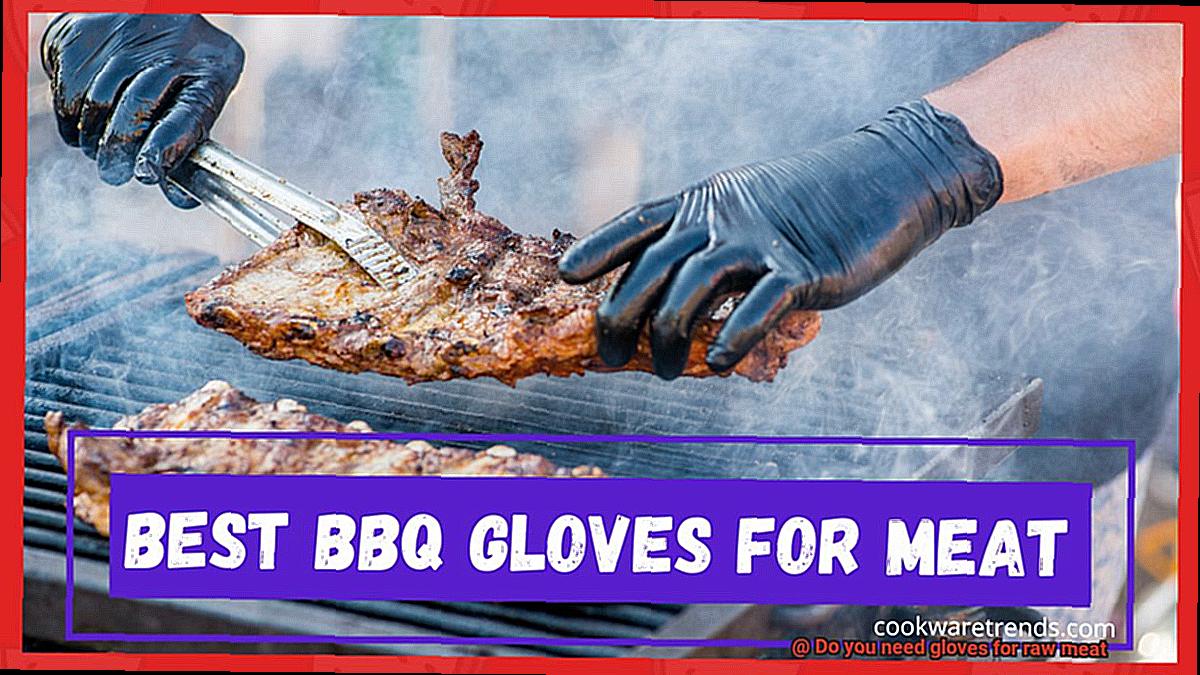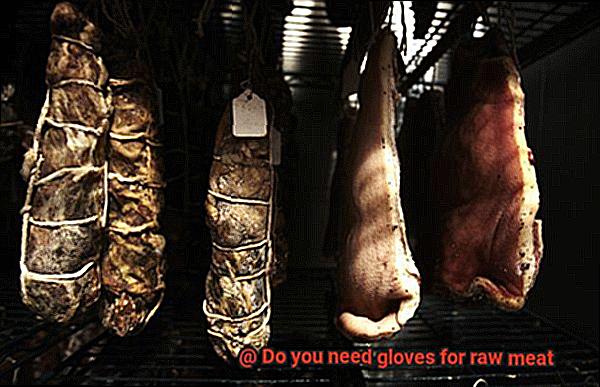Are you a cooking enthusiast who loves to experiment with different types of meat? Then you must know that handling raw meat can be a daunting task. With the constant need to maintain hygiene and steer clear of harmful bacteria, it is important to take appropriate precautions. One of the most common questions that arise in a kitchen is whether gloves are necessary for handling raw meat.
The answer isn’t as simple as you might think. While some professionals swear by the use of gloves, others argue that a thorough hand wash is enough to keep things safe. With so many varying opinions, it can be challenging to figure out what the best course of action is.
In this blog post, we’ll dive into the pros and cons of using gloves while handling raw meat. We’ll explore the various types of gloves available, their benefits, and whether they are necessary for safe food handling. Additionally, we’ll look at potential risks associated with glove usage and situations where they might not be the best choice.
If you’re curious about whether gloves are necessary when dealing with raw meat, read on to find out the truth. And who knows – you may just learn a few tips and tricks that will make your kitchen adventures safer and more convenient.
Contents
The Debate: Gloves vs. Proper Hand Washing and Sanitation Practices
The ongoing debate between gloves and proper hand washing and sanitation practices when handling raw meat has been a hot topic for years. While both options have their merits, it ultimately boils down to personal preference and compliance with food safety regulations.
Proponents of gloves argue they provide an extra layer of protection against bacteria and cross-contamination. By using gloves, one can easily dispose of them after handling raw meat, reducing the risk of spreading harmful bacteria to other surfaces or foods. Gloves can also help prevent cuts and punctures from sharp bone or knife edges, further reducing the risk of infection.
Those who advocate for proper hand washing and sanitation practices, on the other hand, maintain that gloves can create a false sense of security. If not changed regularly or disposed of properly, gloves can actually cause more harm than good by spreading bacteria. Proper hand washing with soap and warm water for at least 20 seconds is often sufficient to remove harmful bacteria and prevent cross-contamination.
It’s important to note that gloves should never be a substitute for proper hand washing and sanitation practices. Even if one chooses to use gloves when handling raw meat, it’s vital to wash hands thoroughly before and after putting them on. Furthermore, gloves should be changed frequently during the cooking process to ensure they are not spreading bacteria.
Aside from using gloves or practicing proper hand washing techniques, there are other measures one can take to ensure food safety when handling raw meat. These include:
- Using clean utensils and surfaces when dealing with raw meat.
- Keeping raw meat separate from other food items in the kitchen to prevent cross-contamination.
- Cooking meat thoroughly to kill any harmful bacteria that may be present.
Pros of Using Gloves for Handling Raw Meat
The advantages of wearing gloves are numerous, and they can make a significant difference in terms of hygiene and safety.
Firstly, gloves can help prevent the spread of harmful bacteria such as E. coli and salmonella, which are commonly found in raw meat. By avoiding direct contact with the meat, you can reduce the risk of contamination and keep yourself and others safe.
Secondly, gloves provide protection against cuts and injuries when handling sharp knives or other kitchen tools. Raw meat can be slippery and difficult to grip, so wearing gloves provides a better grip and prevents accidents.
Additionally, gloves make the process of handling raw meat less messy. They can help contain any juices or liquids present in the meat, making it easier to work with and reducing the risk of cross-contamination.
Moreover, individuals with sensitive skin or allergies can benefit from using gloves as it prevents direct contact with certain types of raw meat that may trigger an allergic reaction.
To ensure effective use of gloves, it is important to change them regularly during the cooking process and dispose of them properly after use. It is also crucial to remember that wearing gloves does not replace proper hand washing with soap and warm water for at least 20 seconds.
Overall, using gloves for handling raw meat is a smart and practical way to ensure safe food handling practices. In summary, here are some key benefits of using gloves when handling raw meat:
Cons of Using Gloves for Handling Raw Meat

While it may seem like a good idea at first, there are certainly some cons to consider. As an expert on the topic, I’m here to share some research notes with you.
Let’s start with the false sense of security that gloves can provide. While they may protect our hands from some bacteria and germs, gloves can still become contaminated and spread harmful substances if not changed frequently enough. This means that proper hand washing and hygiene practices should still be a priority.
Another issue to keep in mind is the potential for tearing or puncturing. If a glove tears while handling raw meat, it exposes the skin to harmful bacteria and other contaminants. And if a glove becomes punctured by a sharp object like a knife or fork, it can compromise the glove’s integrity and put the wearer at risk.
But it’s not just our personal safety we need to think about – there’s also an environmental impact to consider. Disposable gloves are often used once and then thrown away, contributing to plastic waste and harming the environment. Reusable gloves require frequent washing and sanitizing, which can also have an impact on water usage and energy consumption.
How to Choose the Right Glove for Handling Raw Meat
When it comes to handling raw meat, the importance of proper sanitation and hygiene cannot be overstated. One simple, yet effective way to minimize the risk of cross-contamination and foodborne illness is by wearing gloves. But with so many options available, how do you choose the right gloves for the job? Here are five sub-sections to consider:
Material
The material of the gloves is a critical factor to consider. Latex gloves are affordable and provide a good grip, but they may cause allergic reactions in some people. Nitrile gloves are more durable and resistant to punctures and chemicals, making them an excellent choice for handling raw meat. Vinyl gloves are also available, but they are less durable than nitrile or latex.
Thickness
Another important consideration is the thickness of the gloves. Thicker gloves offer more protection against cuts and punctures from sharp bones or knives, but they can be less dexterous and make it difficult to handle small objects. Thinner gloves offer greater dexterity but may not provide as much protection.
Size
Choosing the right size glove is essential for comfort and safety. Gloves that are too small can tear easily, while gloves that are too large may slip off or make it challenging to grip items. It is essential to choose gloves that fit snugly but comfortably.
Disposable or Reusable
Consider whether you need disposable or reusable gloves. Disposable gloves are convenient for one-time use and easy disposal, but they can generate more waste and be expensive in the long run. Reusable gloves may require washing and sanitizing between uses, but they can be more cost-effective over time.
Comfort
Finally, make sure the gloves you choose are comfortable to wear for extended periods. Gloves that cause discomfort or irritation may lead to improper usage or removal, increasing the risk of contamination.
The Benefits of Proper Hand Washing and Sanitation Practices
Raw meat can contain harmful bacteria and pathogens such as Salmonella, E. coli, and Listeria that cause foodborne illnesses. By following these simple steps, you can prevent the spread of these harmful microorganisms and ensure the food you prepare is safe for consumption.
Firstly, wash your hands before and after handling raw meat. Scrub your hands with warm water and soap for at least 20 seconds, making sure to clean under your nails and between your fingers. Dry your hands thoroughly with a clean towel or air dryer to prevent bacterial growth.
But it’s not just your hands that require attention. All surfaces and utensils that come into contact with raw meat must be sanitized properly to avoid cross-contamination. This includes cutting boards, knives, and countertops. Using separate cutting boards and utensils for raw meat is a smart move as well.
The benefits of proper hand washing and sanitation practices are numerous. They prevent the spread of harmful bacteria and pathogens, reduce the risk of foodborne illnesses, ensure the food you prepare is safe for consumption, and promote good hygiene.
In summary, here are the sub-topics covered:
- The importance of proper hand washing when handling raw meat
- The proper technique for hand washing
- The significance of sanitizing surfaces and utensils
- Using separate cutting boards and utensils for raw meat
- The benefits of proper hand washing and sanitation practices
Tips for Properly Cleaning and Storing Your Gloves
If you’re someone who enjoys cooking with raw meat, you already know the importance of using gloves. Gloves are a critical barrier between your hands and harmful bacteria that can be present in raw meat. However, it’s not enough to wear gloves alone; you must also ensure that your gloves are thoroughly cleaned and stored properly. In this post, we’ll explain why cleaning and storing your gloves is significant and offer tips on how to do it correctly.
Why cleaning and storing your gloves is crucial
As we mentioned before, gloves act as a barrier between your hands and raw meat. But if your gloves are contaminated with bacteria, they won’t be effective in preventing the spread of those bacteria. That’s why it’s essential to clean your gloves after every use. It’s also crucial to store them properly so that they don’t come into contact with other items that may be contaminated.
Use disposable gloves
Disposable gloves are designed for one-time use and are less likely to harbor bacteria compared to reusable gloves that can accumulate bacteria over time. We recommend using disposable ones if you’re going to use gloves.
Remove gloves carefully
When removing your gloves, avoid touching the outside of the gloves with your bare hands, as this can transfer bacteria onto your skin. Instead, grasp the glove near the wrist and pull it off in a way that turns the glove inside out. Dispose of disposable gloves immediately after use.
Wash reusable gloves thoroughly
If you’re using reusable gloves, wash them thoroughly with warm water and soap after every use. Don’t use the same brush or sponge for cleaning as dishes or other surfaces; instead, use a dedicated brush or sponge for cleaning gloves.
Dry and store properly
After washing, dry your gloves thoroughly before storing them. Moisture can lead to bacterial growth, so make sure they’re completely dry. Store your gloves in a clean, dry area away from any potential sources of contamination, such as raw meat or cleaning supplies.
Common Mistakes People Make When Handling Raw Meat Without Gloves
If you’re handling raw meat without gloves, you may be putting yourself at risk of cross-contamination and foodborne illness. As an expert in food safety, I have seen many people make these mistakes. Here are some tips to help you avoid common mistakes when handling raw meat without gloves:
Firstly, touching other surfaces is a significant mistake that people make when handling raw meat without gloves. Bacteria can easily transfer from the meat onto other surfaces such as countertops, utensils or cutting boards. To avoid this, always use gloves when handling raw meat and make sure to clean all surfaces thoroughly after use.
Secondly, not washing your hands properly after handling raw meat is another common mistake. It’s crucial to wash your hands thoroughly for at least 20 seconds with soap and warm water to remove harmful bacteria.
Another common mistake people make when handling raw meat is undercooking it. This can lead to harmful bacteria surviving in the meat and causing food poisoning. By wearing gloves, you can ensure that the meat is cooked thoroughly and is safe to eat. Additionally, always use a meat thermometer to check that the meat has reached a safe temperature.
Lastly, overhandling the meat can cause it to become tough and dry. When preparing raw meat, it’s vital to handle it as little as possible. Wearing gloves can help you avoid overhandling the meat and ensure that it stays tender and juicy.
Conclusion
In conclusion, the debate on whether gloves are necessary for handling raw meat continues to be a hot topic. While some culinary professionals swear by the use of gloves, others argue that proper hand washing and sanitation practices are enough to keep things safe. Ultimately, it boils down to personal preference and compliance with food safety regulations.
There are numerous benefits to using gloves when handling raw meat, including an extra layer of protection against bacteria and cross-contamination, prevention of cuts and injuries, and making the process less messy. However, there are also potential risks associated with glove usage, such as a false sense of security and environmental impact.
Choosing the right gloves for handling raw meat is crucial. Consider factors such as material, thickness, size, disposable or reusable options, and comfort when selecting your gloves. Additionally, it’s vital to follow proper hand washing and sanitation practices when dealing with raw meat to prevent the spread of harmful bacteria.
Avoid common mistakes when handling raw meat without gloves by not touching other surfaces without cleaning them thoroughly after use. Always wash your hands properly after handling raw meat. Ensure that the meat is cooked thoroughly using a thermometer and avoid overhandling the meat.
By taking appropriate precautions when handling raw meat through wearing gloves or practicing proper hand washing techniques and sanitation practices, you can ensure safe food handling practices in your kitchen adventures.






